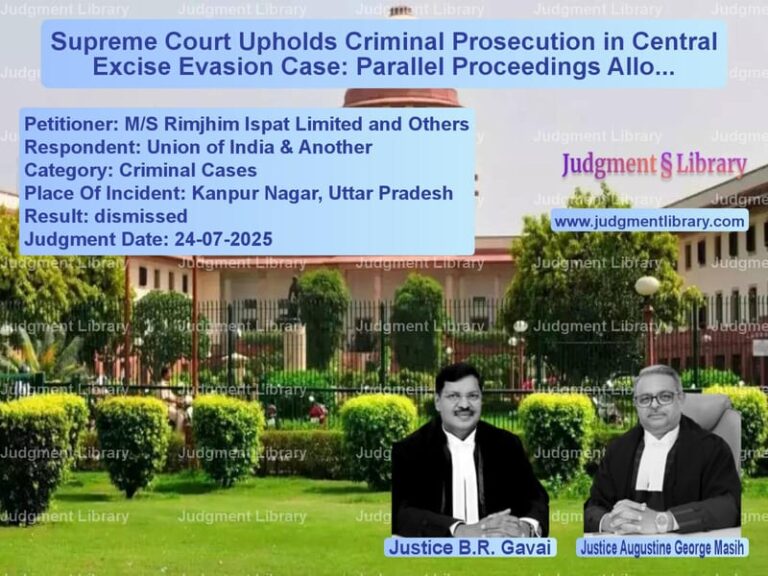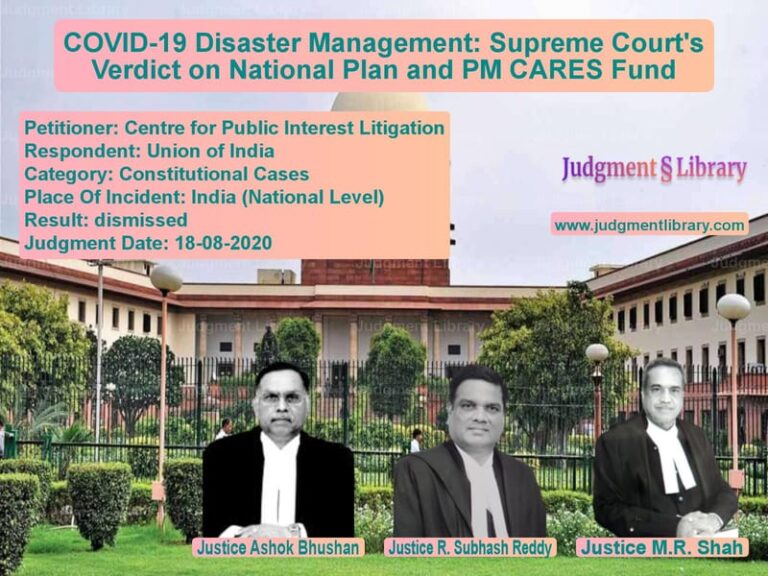Kotak Mahindra Bank vs. Alchemist: Supreme Court Ruling on Loan Recovery and Contempt
The Supreme Court of India recently adjudicated on a contempt petition filed by Kotak Mahindra Bank Limited (KMBL) against Alchemist Assets Reconstruction Company Ltd. and other parties. The case revolved around the enforcement of loan recovery proceedings and compliance with previous court orders. The key issue was whether Alchemist failed to comply with the Supreme Court’s order directing payment of Rs. 4.5 crores to KMBL after selling assets of a borrower company under the SARFAESI Act.
Background of the Case
The case originated from a financial dispute involving a company, Coventry Coil-O-Matic (Haryana) Limited, which had taken loans from ICICI Bank, IDBI, and IFCI as part of a banking consortium. Over time, the loans became non-performing assets, and the debts were assigned to KMBL and Alchemist. While KMBL pursued recovery through the Debts Recovery Tribunal (DRT), Alchemist initiated proceedings under the SARFAESI Act.
The Punjab and Haryana High Court had earlier directed the sale of the borrower company’s land to recover the debts. The High Court specified that out of the recovered amount, Rs. 4.5 crores was to be paid to KMBL and Rs. 9 crores to Alchemist, with any surplus being deposited in the High Court.
Arguments of the Petitioner (Kotak Mahindra Bank)
KMBL, through its counsel, argued:
- Alchemist had failed to comply with the Supreme Court’s order dated May 7, 2012, which mandated payment of Rs. 4.5 crores to KMBL from the proceeds of the property sale.
- The sale of the property was conducted in a clandestine manner without proper notification to KMBL.
- Despite several communications from KMBL requesting payment, Alchemist refused to release the funds.
- The non-compliance with the Supreme Court’s order amounted to willful disobedience, warranting contempt proceedings against Alchemist.
Arguments of the Respondents (Alchemist and Others)
Alchemist and other respondents countered with the following arguments:
- Alchemist had attempted to sell the property at a higher price but was only able to finalize the sale for Rs. 13.5 crores.
- Since Alchemist was the assignee of IFCI and IDBI, it was entitled to recover 98.12% of the total outstanding, while KMBL was entitled to only 1.88%.
- Alternatively, based on KMBL’s claim, it was entitled to only 9.76% of the recoveries.
- KMBL had already received Rs. 2 crores, and therefore, it was not entitled to an additional Rs. 4.5 crores.
- The matter was pending before the High Court, where Alchemist had filed an application to modify the earlier interim order.
Supreme Court’s Analysis
The Supreme Court examined the sequence of events and legal obligations arising from previous court orders. The key observations were:
- The High Court and the Supreme Court had explicitly directed that Rs. 4.5 crores should be paid to KMBL from the proceeds of the asset sale.
- Alchemist had delayed filing its application for modification before the High Court, waiting three years after being granted liberty to do so.
- The Supreme Court emphasized that until the High Court modified its order, Alchemist was bound to comply with the existing directive.
- The argument that KMBL was entitled to only a small percentage of the recoveries did not absolve Alchemist from complying with the Supreme Court’s directive.
Final Judgment
The Supreme Court ruled that Alchemist had failed to comply with the earlier order and directed as follows:
“The amount of Rs. 4.5 crores deposited by Alchemist shall be paid to Kotak Mahindra Bank along with any accrued interest. However, this payment shall be subject to the High Court’s final decision on the actual amount due to KMBL. If the High Court determines that a lesser amount was due, KMBL shall refund the excess with interest.”
While the Court expressed displeasure over Alchemist’s conduct, it decided against taking punitive action under the Contempt of Courts Act since Alchemist eventually complied by depositing Rs. 4.5 crores in court.
Implications of the Judgment
This ruling underscores the Supreme Court’s firm stance on compliance with its directives. Key takeaways include:
- Financial institutions must adhere to court-mandated payment directives, even if they disagree with the apportionment of funds.
- Delays in seeking modifications to court orders do not absolve parties from compliance with existing rulings.
- The judgment reinforces the importance of procedural discipline in loan recovery cases under the SARFAESI Act.
The Supreme Court’s decision ensures that creditors comply with structured loan recovery processes while preserving the authority of judicial directives.
Petitioner Name: Kotak Mahindra Bank Limited.Respondent Name: Mr. Sanjiv Gupta & Others.Judgment By: Justice Deepak Gupta, Justice Aniruddha Bose.Place Of Incident: Punjab.Judgment Date: 23-09-2019.
Don’t miss out on the full details! Download the complete judgment in PDF format below and gain valuable insights instantly!
Download Judgment: Kotak Mahindra Bank vs Mr. Sanjiv Gupta & O Supreme Court of India Judgment Dated 23-09-2019.pdf
Direct Downlaod Judgment: Direct downlaod this Judgment
See all petitions in Bankruptcy and Insolvency
See all petitions in Corporate Compliance
See all petitions in Judgment by Deepak Gupta
See all petitions in Judgment by Aniruddha Bose
See all petitions in dismissed
See all petitions in supreme court of India judgments September 2019
See all petitions in 2019 judgments
See all posts in Corporate and Commercial Cases Category
See all allowed petitions in Corporate and Commercial Cases Category
See all Dismissed petitions in Corporate and Commercial Cases Category
See all partially allowed petitions in Corporate and Commercial Cases Category







